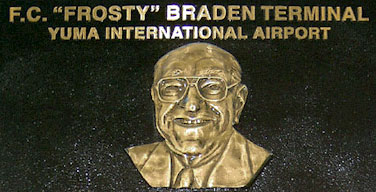Our YCAA History
The Yuma County Airport Authority’s mission is to provide a safe, efficient and customer focused airport to serve Greater Yuma.
Yuma International Airport is managed and operated by the Yuma County Airport Authority which was established in 1965. Our mission is to foster a safe and comfortable environment for people travelling through the airport's terminal, engage and educate the community about aviation related opportunities and promote a business friendly environment.
Yuma's Rich Aviation History
Aviation enthusiasts have enjoyed flying in Yuma since Robert Fowler first landed in Yuma in 1911. In 1925, the Yuma Chamber of Commerce helped secure land for an airport in Yuma and in 1928 President Calvin Coolidge signed the Yuma Aviation Bill and Fly Field was born.
The Chamber's aviation committee started lining up transcontinental and international air races where aviation greats such as Amelia Earhart competed. In 1939, the Yuma County Board of supervisors recommended Fly Field as a base for the Army Air Corps, which began Yuma's rich history in Military Aviation. In 1949, local pilots Bob Woodhouse and Woody Jongeward flew 1,124 hours of continuous flight known as the "Endurance Flight" in an effort to encourage the military to have a permanent presence in Yuma. Their mission was a success!
In 1999, the airport's current terminal was constructed with ample room for future growth opportunities. In 2007, the Yuma County Airport Authority and Marine Corps Air Station Yuma passed a resolution identifying the entities as "Aviation Partners". The result is that today is considered by many to be the best example of a Joint Use airfield between civilian and military operators in the nation.

